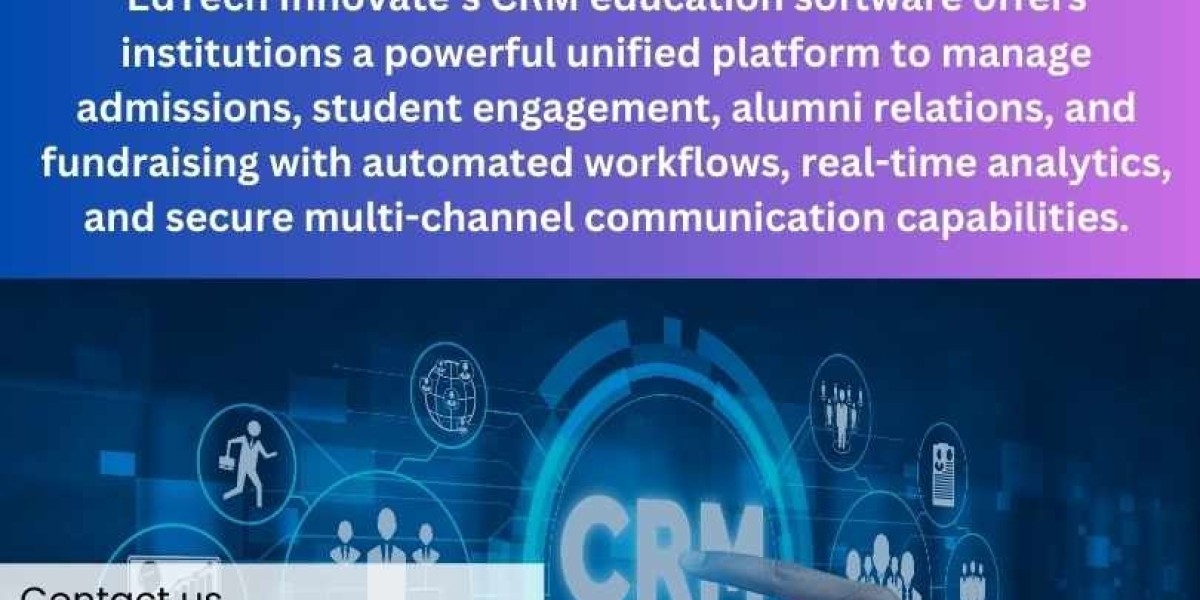As educational institutions adapt to the digital age, managing relationships with students, parents, alumni, and faculty has become increasingly complex. To handle these evolving demands efficiently, institutions are turning to Customer Relationship Management (CRM) systems. While CRMs are traditionally associated with sales and business processes, their value in education has become undeniable. However, not all CRM platforms are created equal, and choosing the right CRM education software depends on your institution’s specific requirements.
This article explores how customer relationship management education, the right CRM software features, and platforms like EdTech Innovate can help institutions select and implement the best CRM software that aligns with their goals.
What is Customer Relationship Management in Education?
Customer Relationship Management in education refers to a system or strategy for managing and nurturing relationships with current and prospective students, alumni, and other stakeholders. The aim is to improve communication, personalize the student experience, and streamline operations such as admissions, engagement, academic tracking, and alumni relations.
A robust CRM education software provides a centralized platform where institutions can automate tasks, monitor interactions, and analyze performance, helping them improve recruitment, retention, and satisfaction rates.
Why CRM Software is Essential for Educational Institutions
Educational institutions handle thousands of interactions daily — from inquiries and applications to academic progress tracking and alumni networking. Managing these manually or through disconnected systems leads to inefficiencies, miscommunication, and data loss.
The implementation of CRM software offers several key benefits:
Automated Communication: Send personalized emails, SMS, or notifications based on student behavior or milestones.
Lead Management: Track and follow up with prospective students effectively.
Data-Driven Decisions: Gain insights into enrollment trends, student engagement, and marketing ROI.
Improved Collaboration: Departments can access shared data and avoid duplication of efforts.
Key CRM Software Features to Look For
To ensure the CRM solution matches your institutional needs, here are some critical features to consider:
1. Lead Capture and Tracking
Efficiently manage inquiries and leads from multiple sources such as websites, social media, education fairs, and emails. The CRM should support real-time updates and lead assignment for timely follow-ups.
2. Student Journey Mapping
From initial contact to graduation and beyond, a CRM should be able to track and manage every touchpoint in a student’s lifecycle.
3. Multi-Channel Communication
Communication tools should include email marketing, SMS, WhatsApp messaging, and push notifications to reach students on their preferred platforms.
4. Customizable Workflows
Every institution has unique requirements. The CRM must allow customization of workflows, dashboards, and data fields for admissions, counseling, academics, and alumni.
5. Integration Capabilities
A great CRM must integrate with your existing Learning Management System (LMS), Enterprise Resource Planning (ERP), and finance platforms for seamless data flow.
6. Analytics and Reporting
Real-time dashboards and detailed reports help administrators and faculty make data-driven decisions and improve performance.
CRM for Small Institutions and EdTech Startups
Not every institution needs a complex, enterprise-grade CRM. CRM for small businesses often meets the requirements of small colleges, training centers, or EdTech startups. These platforms are affordable, scalable, and user-friendly, offering features like:
Basic lead and student tracking
Email and SMS automation
Task and calendar management
Simple dashboards and reports
Solutions such as Zoho CRM, HubSpot, and Freshsales are popular among smaller institutions due to their intuitive design and flexible pricing models.
Best CRM Software for Education
Here are some of the best CRM options tailored for education:
1. Salesforce Education Cloud
Highly customizable and scalable, Salesforce supports large universities with advanced automation, AI insights, and multi-department collaboration tools.
2. HubSpot CRM
Free to start and ideal for mid-sized institutions, HubSpot offers contact management, email tracking, and marketing automation with user-friendly interfaces.
3. Zoho CRM for Education
Affordable and powerful, Zoho CRM enables institutions to manage leads, automate communication, and integrate with Google Workspace, Zoom, and more.
4. LeadSquared Education CRM
Tailored for educational institutions, LeadSquared offers tools for student enrollment management, marketing automation, and real-time analytics.
How EdTech Innovate Helps Institutions Find the Right Fit
Choosing the right CRM involves more than picking a popular brand. Your CRM should align with your institution’s size, type of programs, number of users, and digital maturity. This is where EdTech Innovate plays a crucial role.
EdTech Innovate is a leading consultancy that specializes in implementing education-specific CRM software. Here’s how they help:
Needs Assessment
They begin by understanding your institution’s pain points, workflows, and digital readiness. This ensures that the recommended CRM fits your actual operational needs.
Vendor Evaluation
With so many options in the market, EdTech Innovate compares and evaluates CRM vendors based on pricing, scalability, support, and customization options.
Tailored Implementation
From data migration to user training, EdTech Innovate ensures smooth CRM deployment, minimizing disruption and maximizing usability.
Ongoing Support
Their team provides post-implementation training, troubleshooting, and optimization services to ensure the CRM evolves with your institution’s needs.
Benefits of Using CRM Education Software
Once implemented effectively, CRM education software provides several transformative benefits:
Enhanced Student Experience: With personalized communication and faster responses, students feel valued and supported.
Increased Enrollment Rates: Effective lead management boosts conversion from inquiries to enrollments.
Improved Administrative Efficiency: Automation reduces manual tasks, freeing up staff to focus on strategic activities.
Better Retention and Alumni Engagement: CRMs help maintain engagement through reminders, check-ins, and newsletters, even after graduation.
Actionable Insights: Access to real-time analytics empowers administrators to refine recruitment and academic strategies.
Final Thoughts
As digital transformation continues to reshape education, adopting the right CRM education software becomes essential for institutions that aim to stay competitive and student-focused. From handling admissions to nurturing alumni, a CRM simplifies processes and creates meaningful connections.
Whether you’re running a growing EdTech startup, a regional college, or a global university, there is a CRM that fits your specific requirements. With expert guidance from EdTech Innovate, you can navigate the CRM landscape with confidence, ensuring you choose a system that supports your mission, enhances student experiences, and drives long-term success.
In the end, it’s not just about picking the best CRM software — it’s about choosing the one that truly fits your institution’s evolving goals.






